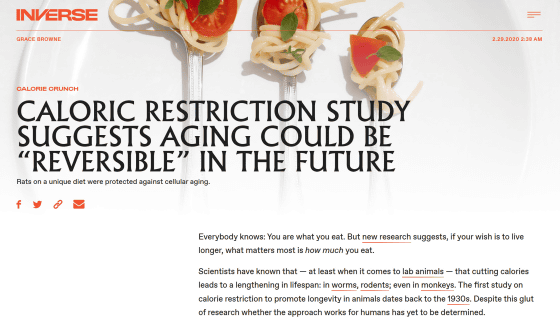Research reveals that calorie restriction prevents adverse effects associated with cell aging

It has been known for a long time that 'you can live longer by limiting the calorie intake per day', and it has been confirmed in
Caloric Restriction Reprograms the Single-Cell Transcriptional Landscape of Rattus Norvegicus Aging: Cell
https://www.cell.com/cell/fulltext/S0092-8674(20)30152-5
Eat less, live longer-Salk Institute for Biological Studies
https://www.salk.edu/news-release/eat-less-live-longer/
Caloric restriction study suggests aging could be “reversible” in the future
https://www.inverse.com/mind-body/rat-study-shows-careful-caloric-restriction-could-lead-to-a-longer-life

The phenomenon of prolonging life by restricting calories has been confirmed not only in small animals such as daphnia, flies, rats, but also in animals close to humans such as rhesus monkeys, but much is unknown about the mechanism behind this phenomenon That's right.
Aging is one of the most dangerous factors for many diseases that develop in humans, such as cancer, dementia, and diabetes. Animal studies have shown that caloric restriction is an effective way to intervene in these age-related diseases, and there is increasing hope that caloric restriction is an effective approach in humans as well. That there is.
The research team divided rats into two groups, a group that eats a normal diet and a group that eats a 30% reduced calorie diet, and restricted their diet from 18 months to 27 months after birth. This period of 18 months to 27 months after birth is equivalent to about 50 to 70 years when converted to humans, and it seems that the effect of caloric restriction at the time when the age-related disease starts to increase has been verified.

At the start of the diet and at the end of the diet, the research team isolated a total of 40 cell populations from a total of 56 rats each, and analyzed the levels of gene activity and the overall level of cells in a particular tissue. The composition was analyzed. It is said that the collected cells totaled 168,703, and the cell group was collected from various tissues such as fat, liver, kidney, aorta, skin, bone marrow, brain, muscle and so on.
Analysis revealed that the various changes that occurred with aging in the group that took the normal diet were not seen in the group that performed calorie restriction. The 27-month-old rat that had been calorie-restricted seems to have a similar tissue structure and cells as the 18-month-old rat. Overall, the researchers report that 57% of the aging-related changes in cell composition seen in rats on a normal diet were not found in calorie-restricted rats.
Many age-related chronic illnesses have been linked to increased inflammation that occurs in the body. In rats on a normal diet, the number of immune cells responding to inflammation increased dramatically with age. However, in calorie-restricted rats, the number of immune cells was not affected by aging, and the expression levels of many anti-inflammatory genes in adipose tissue seemed to be the same as when they were young.

'Our approach provided not only the effect of caloric restriction on cell composition, but also the most complete and detailed study of what is happening at the single cell level during aging.' Said Guang-Hui Liu of the research team. 'The main finding in this study is that the inflammatory response that occurs during aging is systematically suppressed by calorie restriction,' said Jing Qu, a research team also.
The researchers also
'People say, 'You are made of what you ate,' but I know this is true in many ways,' said Concepcion Rodriguez Esteban, a research team commenting on aging. He pointed out that the state of the cells involved in the process depends on the interaction with the environment, including the diet. The researchers believe that the new information will help them develop drugs to stop aging.

Related Posts:







